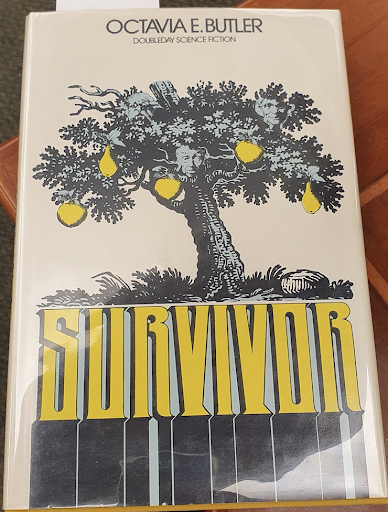Words by Riziki Millanzi
The book was first published in 1978 and is set within the world of Butler’s Patternist series. Butler used the money gained from selling Survivor to US publisher Doubleday to travel to Maryland so that she could conduct research for her 1979 neo-slave narrative and bestseller Kindred. This is just one of the many reasons that Butler ended up disliking the novel, remarking to a friend in a letter that Survivor “needed – desperately — another run through the typewriter” and that her desire to write Kindred left Survivor rushed, incomplete and disappointing.
Butler publicly disavowed Survivor and it has been out of print since 1983, but dedicated readers are still finding ways to read Butler’s ‘lost’ novel. Most are unable to afford the astronomical prices that some copies are going for online but are still able to find well-loved and rare copies of the novel in public and university libraries across the world.
Survivor is a flawed yet ambitious sci-fi novel, which combines the tropes of the missionary science-fiction sub-genre with elements that easily could have been found within the captivity narratives of early American literature. Butler tries to do too much in just one novel, with an alien species that bases its hierarchy and complicated caste system on colour, a misogynistic religious mission that is doomed to repeat the past mistakes of colonialism, and a young, female protagonist who is determined to survive no matter what. Alanna is undoubtedly the best thing about Survivor – a unique main protagonist who develops into a strong leader and ambassador over the course of the novel, and that offers up commentary about how many young Black women are forced to code-switch and assimilate into the dominant culture in order to survive and make a living.
I would also recommend reading Butler’s short novella A Necessary Being, a prequel to Survivor that is available in print and was published alongside the brilliant short story Childfinder in the posthumous 2014 collection Unexpected Stories. A Necessary Being delves a bit deeper into the history, class and racial aspects of Survivor’s Tehkohn alien species, providing readers with the opportunity to consider how this strange world reflects the conflict and politics present within our own.
After reading both Survivor and A Necessary Being, I would like to see them both reprinted in a collected edition. If Survivor was indeed finally reprinted again after almost forty years, I feel like Butler’s views about the novel should most definitely be acknowledged and maybe even included as a foreword. However, for all the flaws that both Butler and her reviewers highlighted about the novel, there is a whole lot to admire and enjoy about Survivor too.Although Survivor is not as polished as Butler’s 1979 classic Kindred, or as accomplished as the 1993 Nebula award-winning Parable of The Sower, it makes up for its shortcomings by providing readers with a refreshing take on already established science-fiction genre tropes that opens up discussion and thought about race, gender and class. Ultimately, if you can get your hands on a copy of Survivor, it’s a great read and a piece of science-fiction history that you can’t afford to pass up.

